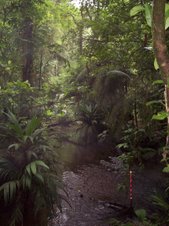If you haven't already read the 3-part series "Losing Ground" featured in the Times-Picayune, do so now! There is an excellent interactive graphic as well, explaining the issues clearly and concisely for those who have little time for extensive, non-scholarly reading (e.g., students).
The bottom line is, wetlands have been and are currently being lost at a rate far more rapid than most people had realized. Those maps of Louisiana's coastline that we're all familiar with, showing miles of intricately webbed marshes protecting New Orleans from storm surge? Turns out those are based on 1930s data, and the modern-day picture is disturbingly worse.
Think we still have a long time - maybe 30-50 years, beyond most of our lifespans - to solve the problem? Think again - turns out we have 10 years to restore wetlands before they're too far gone to repair.
Think solving the problem is too expensive? Well, yes, $45 billion is a big number, but here are a few points to consider to put this number into perspective:
> $45 billion = 5-8 months in Iraq at recent (pre-surge) spending rates of ~$6-9 billion/MONTH (source: http://usgovinfo.about.com/library/weekly/aairaqwarcost.htm)
> Louisiana is critical to the nation's oil and gas industry infrastructure, with 19 active refineries (15% of total refining capacity in the country), thousands of miles of pipelines, and the closest access to the huge offshore oil-drilling industry (source: http://www.lmoga.com/industryoverview.html). Whatever your opinion may be re: our dependence on oil, currently the nation's economy is inextricably linked to petroleum prices.
> Estuaries are critical to the seafood industry. Louisiana is the largest producer of crawfish in the world, and also exports huge quantities of oysters, catfish, and other seafood nationally and globally (source: http://en.wikipedia.org/wiki/Louisiana)
> The Mississippi River is an important shipping channel and New Orleans is a crucial access point and port, with ~80 million tons/year passing through (source: http://www.yearontheriver.com/stories/rvr_nav.php)
> This isn't even getting into all the qualitative, difficult-to-quantify reasons why New Orleans and southern Louisiana are crucial to the United States - culturally, musically, et al. - nor does it touch on the fact that we are the United States of America, and we as a country didn't shirk at spending huge sums to rebuild Manhattan post-9/11, San Francisco post-Loma Prieta (or post-1906), Chicago post-fire, etc.
OK, stepping off the soapbox - what does this have to do with biostats or science in general? Well, the need for "proper" science, for thorough studies and full understanding of all potential impacts of action has hindered our actions to this date, and brought us to the point we are at today. While it's true that as scientists we need to be cautious and objective and understand impacts of potential conservation and restoration measures, when do the dangers of inaction or postponement of action outweigh the need for urgent action? How many pilot studies need to be done before we accept the data and act on it? I'm torn, because as a scientist I say we need to fully understand the processes before acting, but as an environmentalist and concerned citizen I say that we need to do something about this, and fast. And I'm concerned that science and the lengthy process of conducting studies and writing reports is all too commonly abused by politicians who benefit from retaining the status quo (see this book for an excellent summary of this abuse, particularly as perfected by the current administration)...while meanwhile opportunities are slipping out of our hands. See this quote in the first TP article for just one example:
"In a convoluted process, restoration projects proposed by a local sponsor must undergo a series of studies of their economic and ecological benefits and detriments. Congress must approve the studies, which can take three to five years. Then, in a separate process, the corps must seek money in its annual budget to conduct them."
In all, it can take over 10 years for any - even small - restoration action to occur, by the time all studies and bureaucratic processes have been completed. We don't have 10 years...
So, where do we draw the line? When - if ever - should the slow, cautious steps prescribed by the scientific method be overruled by the need for urgent action? Who should make the decisions regarding when or how - scientists (ecologists, engineers, wetland biologists?)? Politicians? Committees?
Subscribe to:
Post Comments (Atom)




2 comments:
Nice blog. I am always up for a synopsis of events like this because I feel like I never have the time to read them thoroughly. I honestly wasn't aware of all of the economic information about Louisiana.
The wetlands are also close to my heart. I did a service learning class on Natural Resource Conservation with Dr. Bart and we volunteered at Bayou Sauvage. It was an amazing experience especially to see the impact of Katrina and how they had to completely change their management strategy. It made the issue of losing wetlands a lot closer to home. By the way, thanks for the reference, I look forward to reading the paper.
As wetlands are also my area and my passion. I am glad they are calling attention to the issue. I am torn as well but for a different reason. While I am working to restore wetlands I wonder if we are fighting a battle that we are supposed to lose. Historically, the river has switched course many times building all of the land south of Lake Ponchatrain of which the North Shore used to be the coast of the Gulf of Mexico. The river provides sediment when flooding which built the wetlands. As the river switched course the wetlands associated with the previous course slowly deteriorated due to lack of sediment supply. In the meantime new land was being built elsewhere. Eventually the river would come back to the area and rebuild the wetlands naturally. Many of the wetlands that are disappearing would naturally be cut of from sediment supply right now. The problems lies with the fact that humans do not let the river switch course anymore which currently would be down the Atchafalaya (I know spelling is wrong) where some land is currently being built. Currently the river has reached the continental shelf an the sediment is being dumped into deep water and lost. Allowing flooding and river switching would be ideal. However I am not this narrow minded and understand the political, econimical and social effects of allowing flooding and changing the course of the river. I am realistic. I will still work to save the wetlands but this thought is often in the back of my mind. Are we fighting natural processes and if so can we win?
Post a Comment